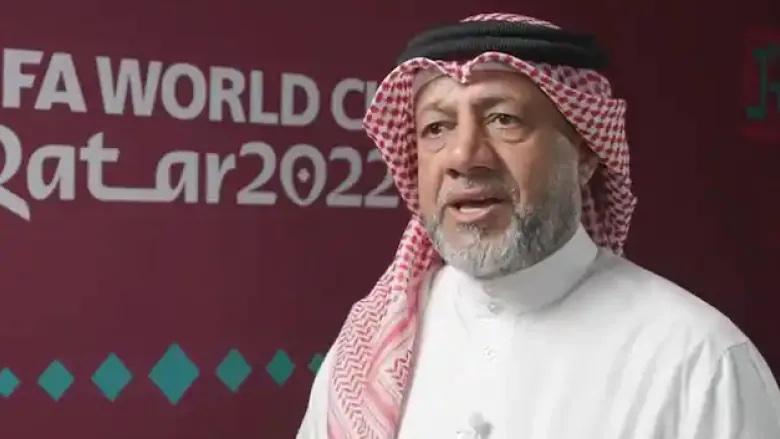A Qatar World Cup ambassador says his comments on the LGBTQ community were ‘taken out of context’ amid a major international backlash citing ‘homophobia’.
A Qatar World Cup ambassador who has come under fire for remarks on the LGBTQ community claimed his comments to the German media outlet were taken out of context, assuring “everyone is welcome in Qatar” as long as they respect the country’s culture and laws.
Khalid Salman, a former Qatari international, sparked outrage this week following an interview with German broadcaster ZDF in which he reportedly said homosexuality is “damage in the mind”.
“They have to accept our rules here,” Salman said. “[Homosexuality] is haram (forbidden). You know what haram means?”
He said he was talking about alcohol and not homosexuality; he meant alcohol affects the way the brain works. pic.twitter.com/AiAY1GBVVt
— Ghada Oueiss غادة عويس (@ghadaoueiss) November 9, 2022
When the interviewer asked the sports ambassador to clarify if “gay is haram”, Salman said: “I am not a strict Muslim but why is it haram? Because it is damage in the mind.”
In a video seen by Doha News following global outrage, Salman alleged his comments were actually in response to a question about intoxication and alcohol. “I said everyone is welcome in Qatar,” Salman claimed.
“Intoxicants and alcohol came up, and I said they were very harmful to the mind. The journalist misunderstood what I said and reported that I was referring to homosexuality – based on his own interpretation, or maybe intentions,” he said in the video.
Doha News has reached out to ZDF to obtain access to the full raw footage but has yet to receive this. Qatari authorities have yet to comment on the matter.
Homosexuality is illegal in the Gulf state and has been a contentious topic for rights groups, football federations and western media over the last few months in particular – all of which have questioned whether members of the LGBTQ community would be welcome in the Gulf state during the World Cup.
As a response, Qatari officials have repeatedly stressed that “everyone is welcome”.
Chief Executive Officer of Qatar 2022 Nasser al Khater recently said while Qatar will not change its anti-LGBTQ+ laws, it has insisted that no one will face discrimination during the 29-day tournament.
Following the release of Salman’s interview, Germany’s Interior Minister Nancy Faeser, who visited Qatar a week ago amid a dispute over provocative comments she made criticising the Gulf state’s hosting of the tournament, said she was given assurances of safety by officials.
“Of course such comments are awful and that is also the reason why we are working to hopefully improve things in Qatar in the future,” Faeser said.
“I have no new indications from him (Qatari interior minister) now that anything should have changed in this regard,” she added.
Qatar 2022 target of ‘racism’
With the global spotlight being placed on the Middle East’s first ever FIFA World Cup, host nation Qatar has been the subject of incessant Western scrutiny over its human rights record.
However, officials say much of the criticism and campaigns to boycott the event largely overlooks efforts made by Qatar to address such concerns, including widespread labour reforms.
Qatar’s Amir Sheikh Tamim bin Hamad Al Thani as well as other top Qatari officials have repeatedly slammed the “racism” behind the campaigns, especially since they have continued to emerge despite Qatar addressing concerns and launching major reforms.
Last month, the amir described the campaigns as “ferocious” and “malicious” and questioned intentions behind the criticism.
Echoing similar sentiments, Sheikh Mohammed also cited racism.
Speaking to Le Monde, the Qatari diplomat said he came across recent commentary that accused Qatar of not being “intellectually and culturally ready” to host the World Cup.
“Is such racism acceptable in Europe in the 21st century? Football belongs to everyone. It is not reserved for a club of elites. Four hundred and fifty million Arabs are delighted that the World Cup is finally being held in their region,” said Sheikh Mohammed.
More recently, Al-Khater said the campaign against Qatar and its hosting of the 2022 FIFA World Cup is linked to Europe’s refusal to see a country outside its region take on the tournament.
“European countries feel they have monopoly over the World Cup. Europe has hosted 11 tournaments out of 22 tournaments, of course it refuses that a country like Qatar or an Arab Muslim country hosts a tournament like the World Cup,” Al-Khater told Al Jazeera Arabic in a televised interview.
Meanwhile, the World Cup CEO added that Europe has long seen the Arab world as a conflict-ridden region, a depiction that has also been repeatedly highlighted in its media discourse.
This week, French outlet Le Canard Enchaîné has come under fire for publishing a caricature depicting Arabs in ‘Qatar’ football kits as terrorists. The image employs the exhausted use of ‘savages’ – ‘long bearded’ angry men with dark hair, angry expressions in possession of guns and knives.
However, Al-Khater believes the World Cup will debunk such images portrayed by Europe.
When asked about Qatar’s strategy in responding to the ongoing criticism, Al-Khater said that some were worth responding to while others were unworthy of an official address.
“For us, the success of the World Cup is a priority,” he said.







